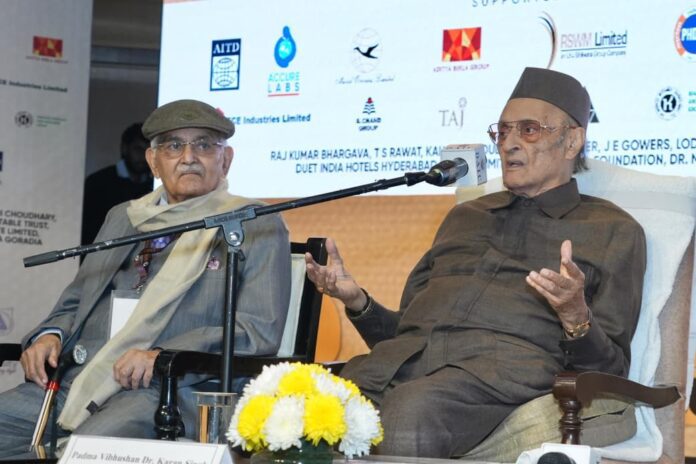New Delhi, November 29, 2025 : The Indian Trust for Rural Heritage and Development (ITRHD) today inaugurated the three-day International Conference on the Preservation of Rural Buddhist Heritage at the Dr. Ambedkar International Centre, New Delhi. The conference brings together leading scholars, conservation experts, policymakers, practitioners, international institutions and monastic representatives to collectively address the challenges and opportunities related to conserving India’s vast but largely unprotected rural Buddhist heritage.
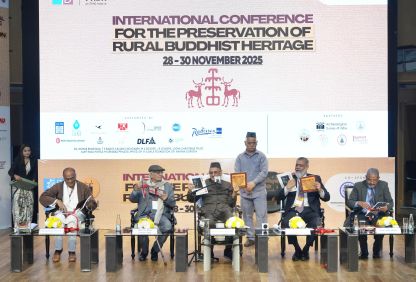
The conference began with chanting, the ceremonial lighting of the lamp followed by the inaugural address by Mr. S. K. Misra, Chairman of ITRHD. The morning session featured addresses by Padma Vibhushan Dr. Karan Singh, Dharamacharya Shantum Seth, and other distinguished guests, and concluded with the release of the ITRHD Journal on Buddhist Studies.
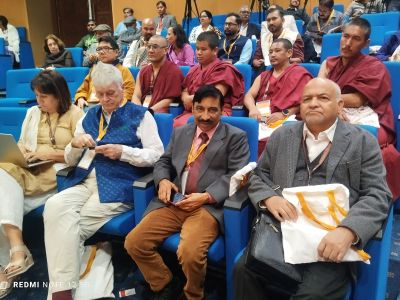
Mr. S. K. Misra welcomed the delegates to the International Conference on Rural Buddhist Heritage, thanking contributors for their support. He highlighted ITRHD’s work in restoring rural heritage sites and announced that five acres in Andhra Pradesh have been allotted for a new academy dedicated to Buddhist heritage. Calling the project ambitious but necessary, he urged collective efforts to document and conserve rural sites and affirmed that local communities remain their true custodians.
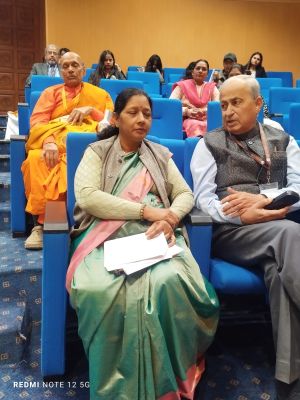
Padma Vibhushan Dr. Karan Singh, addressing the gathering, said, “India’s strength lies in its multiplicity.” Noting that Buddhism though followed by few today has profoundly shaped the country’s cultural ethos, he welcomed efforts to uncover rural Buddhist sites but emphasized that local communities must recognize this heritage as their own. Reaffirming that “India will always be the land of the Buddha,” he urged people to rise above division and work together in a spirit of harmony.
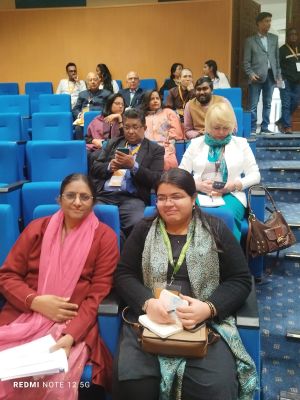
Mr. Shantum Seth highlighted how artisans across rural villages preserve traditions ranging from stone and textile work to local culinary practices, providing pride and livelihood to communities. He urged Indians to “reclaim the Buddha as an Indian ancestor,” noting that countries like China are advancing more rapidly in developing Buddhist pilgrimage circuits. He emphasized the role of education in understanding the mind and emotions and described the collective revival of Buddhist heritage as “sangha work” involving everyone.
Speaking at the occasion Mr. Abhijit Halder, Director General of the International Buddhist Confederation, underscored the communal aspect of conservation, stating that “Buddha’s teachings remind us that conservation is everyone’s duty, and when communities thrive, monuments and monasteries breathe. Preserving rural Buddhist heritage is not just about structures, but also the people, traditions, and ecosystems that sustain them.”
Prof. A. G. K. Menon delivered the vote of thanks, highlighting the importance of protecting India’s Buddhist heritage and acknowledging the efforts of all involved in turning the vision of a rural Buddhist heritage academy into a reality.
*A Conference Anchored in Urgency and Vision*
India’s rural Buddhist sites—many unprotected, undocumented, and vulnerable—represent a profound civilizational legacy. While iconic sites such as Bodhgaya, Sarnath, and Kushinagar receive global attention, hundreds of lesser-known rural sites face threats from neglect, development, climate impacts, and lack of community-led conservation.
The conference lays the groundwork for ITRHD’s proposed Academy for Rural Heritage Conservation and Development at Nagarjunakonda, Andhra Pradesh. The Academy will train administrators, scholars, conservators, skilled workers, and local communities, pioneering methods that blend traditional knowledge with contemporary practices to safeguard unprotected heritage.
Two sessions held on the first day explored rural heritage conservation and global perspectives, contributing to a multidisciplinary roadmap for the Academy’s curriculum, pedagogical structure, and long-term strategy.
Supported by the International Buddhist Confederation, the Ministry of Culture (Government of India), Gautam Buddha University, the School of Planning and Architecture (Delhi), Archaeological Survey of India, Dharma College (USA), and the Dr. Ambedkar International Centre, the event marks the start of a collaborative blueprint for preserving India and Southeast Asia’s shared Buddhist legacy.
